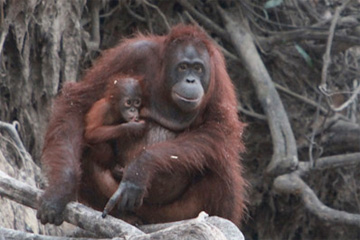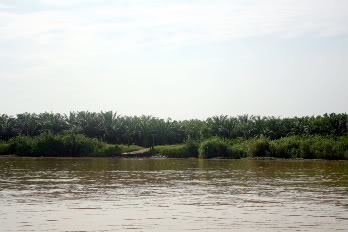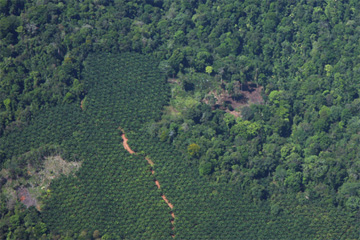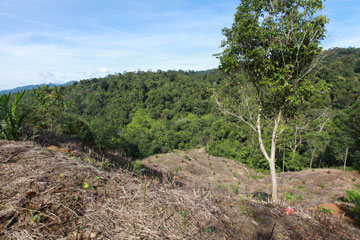- Earlier this month at a colloquium to implement wildlife corridors for orangutans in the Malaysian state of Sabah, Dr. Yusof Basiron, the CEO of Malaysian Palm Oil Council (MPOC), told conservationists and primate experts that the palm oil industry was ready to fund reforestation efforts in the corridors.
- “We can raise the money to replant [the corridors] and keep contributing as a subsidy in the replanting process of this corridor for connecting forests,” Basiron said in response to a question on how the palm oil industry will contribute.
- “Money is not a problem.”
Earlier this month at a colloquium to implement wildlife corridors for orangutans in the Malaysian state of Sabah, Dr. Yusof Basiron, the CEO of Malaysian Palm Oil Council (MPOC), told conservationists and primate experts that the palm oil industry was ready to fund reforestation efforts in the corridors.
“We can raise the money to replant [the corridors] and keep contributing as a subsidy in the replanting process of this corridor for connecting forests,” Basiron said in response to a question on how the palm oil industry will contribute. “Money is not a problem. The commitment is already there, the pressure is already very strong for this to be done, so it’s just trying to get the thing into motion.”
He added: “I hope it can be done.”
 Oil palm seed. Palm oil is used widely in processed foods. By virtue of its high yield, palm oil is a cheaper substitute than other vegetable oils. Photo by: Rhett A. Butler. |
Basiron didn’t specify how the palm oil industry planned to fund reforestation, which can be quite expensive, but earlier in the speech he mentioned the MPOC’s Wildlife Conservation Fund. This fund was started in 2006 with 20 million ringgits (approximately six million US dollars) half from the Malaysian government and half from the palm oil industry.
Despite the availability of these funds conservationists at the conference said that most organizations shied away from taking the money. Not because the funding was from the heavily-criticized palm oil industry, but because of conditions attached to the funds.
According to a brochure put out by MPOC the monies used in the fund must “[help] to portray the good image of Malaysian palm oil by providing concrete assurances that its cultivation does not cause deforestation or loss of wildlife and their habitat”.
However, peer-reviewed independent scientific studies that have shown that biodiversity drops over 80 percent when forest is exchanged for oil palm plantations and 55-59 percent of palm oil plantation between 1990 and 2009 in Malaysia occurred on forested land.
“Information obtained from these research projects will be used to convince and assure palm oil users and NGOs that Malaysian palm oil is produced sustainably with minimal or no negative impact on the environment,” the statement continues, implying that researchers are expected to paint the palm oil industry positively even if their findings say otherwise.
 Palm oil plantation in Malaysia. Photo by: Rhett A. Butler. |
Basiron said at the colloquium that he believes “Malaysian palm oil plays a responsible role to coexist with biodiversity, so we started our Wildlife Conservation Fund […] We will match your fund one-for-one [..] You give one dollar and I’ll give one dollar, so there will be more funds, if you go through our way.”
Basiron further argued that going through the palm oil industry for conservation funds would be quicker and cheaper than working with new international initiatives set-up to pay nations to keep forests standing for their carbon, such as REDD.
“If you are trying to conserve […] through the natural value of the forest, it is a slow process, it is painful process, a costly process. But the palm, provided you agree to the principle that certain land has to be set aside for commercial production and raising the revenue, then some of this revenue could be brought back to conservation.”
He concluded that “[the] palm oil industry can afford to contribute to conservation”.
Palm oil: good for food and the economy
While offering support to save Malaysia’s orangutans, Basiron’s speech to conservationists, government officials, and other palm oil executives, mostly focused on defending the industry from criticism for environmental degradation and wildlife loss, while portraying the palm oil industry as vital to the Malaysian economy and global food needs.
 Orangutans in Kalimantan. Photo by: Rhett A. Butler. |
“Look at this,” Basiron said pointing to a graph of global population. “Population is increasing. It’s not our fault that population is increasing. We have to supply their food.”
Palm oil consumption was outpacing even population growth, said Basiron, and the industry was under “pressure” to produce even more palm oil.
“We are doing a very good service, a vital service, to supply the world with an edible oil, where the world is so dependent on Malaysia and Indonesia as the only mega source of net exporters of edible oils,” Basiron said. “[Palm oil], as you know, is made up of protein, carbohydrates, and oil, the three major components of food. We are the major source of world oil, edible oil.”
Thirty one percent of the world’s edible oil is palm oil and Malaysia is the world’s largest exporter. Indonesia—the third highest emitter of greenhouse gases in the world, due to massive deforestation—is second.
“Some of you are pro-orangutan, some of us are pro-palm oil, some of us are pro-forests,” Basiron told the colloquium participants. “But if we look at it in a dispassionate way then what we see is, yes, we still have to deal with the process of development.”
Basiron added that the participants should not judge Malaysian wealth by the Malaysians they met at the conference. “You may see some us here looking very wealthy—but actually the Malaysian per capita income is very low compared to the Western world, and we need to develop.”
Over the past couple decades palm oil has been good to Malaysia in terms of wealth: in 2008 the Malaysian palm oil industry was worth 64 billion ringgits (18 billion US dollars).
 Oil palm plantations along the Kinabatangan River, an area where corridors are proposed. Photo by: Jeremy Hance. |
“Isn’t that good money?” Basrion asked. “I’m sure it is.”
Basiron further argued that palm oil was keeping Malaysia’s economy afloat in the midst of a worldwide recession, describing Malaysians as “out there to buy like there is no tomorrow”.
According to Basiron, palm oil brought a variety of benefits to society, including saving species from being hunted for food.
“We don’t go hunting for animals anymore, we buy meat from the supermarket. When we were poor I can tell you that whatever moves—that is food, but now the oil palm gives you the necessary income to avoid that kind of culture where we are able to buy our regular sources of food and prevent unnecessary hunting,” he said.
Several local conservationists, however, stated that workers on palm oil plantations, who are largely Indonesian and Filipino, are paid so little that they turn to the forest for meat, setting snares which have been documented to catch the Bornean rhinoceros and the Bornean pygmy elephant, both classified as Critically Endangered by the IUCN Red List.
Palm oil as ‘avoided deforestation’?
“The land is a good base for development,” Basiron said, “and this is where we get into conflict, how much land to develop, how much land to conserve?”
Basiron spoke of finding an ‘optimal ratio’ between conservation and development, painting the two as stark contrasts.
“Yes, we have to live in a world where sustainability is often very difficult to define, some of the current debates would like forests, and forests, and more forests, because that represents sustainability. But can you imagine a country where we live with a 100 percent forests? Where would we live? […] So obviously there has to be a percentage of the land that would have to be devoted to agriculture and a percentage perhaps to forests […] What is the optimal ratio? And nobody can help in this coming up with an optimal ratio. The optimal ratio is not stop what we are doing and whatever is left is ‘optimal ratio’ of forests. No, optimal ratio means something that we have to keep defining as we go along.”
 Oil palm plantation meets rainforest in Costa Rica. Photo by: Rhett A. Butler. |
Basiron went further, arguing that supporting Malaysian palm oil was in fact supporting ‘avoided deforestation’.
“What would happen hypothetically if we don’t produce palm [oil] as we do now, if we were to replace the palm we produce with soybean?” Basiron asked.
Oil palm has the world’s highest yield of edible oil per hectare: over ten times greater than that of soybean oil. Basiron said that if there were no palm oil and soy had to fill the gap then soy bean cultivation “would require again another 4 million hectares” to produce the same amount of oil as palm oil currently produces.
While Malaysia’s climate was not right for soybean production, Basiron said the additional soybean cultivation required “could happen in Brazil.” Therefore, “oil palm in a way is contributing to what we call ‘avoided deforestation,'” he concluded.
Allegations of double-standard
Considering the high yield of palm oil and its economic benefits, Basiron went on to suggest that developed nation had double-standards when criticizing Malaysia for deforestation due to palm oil.
“If you look at the Malaysian land use ratio of forests to agriculture you’ll see the figures—it is still very healthy,” Basiron said, adding that currently 56 percent of Malaysia is forested, while he pointed out that the United States forest cover is only 30 percent and Britain is 10 percent.
In terms of forested land, might there not be, he asked, “one set of standards for developed, and one set of standards for developing countries?”
 Rainforest cleared for oil palm agriculture in North Sumatra. Photos by Rhett A. Butler. |
During the question and answer session, however, it was pointed out that the United States never had as much forest as Malaysia to begin with, since large percentages of land area in the US are made up of plains and desert. Also, large-scale deforestation was not committed by modern Britain, because clearcutting of the island began with the Roman invasion nearly two thousand years ago, whereas almost the entirety of Malaysia’s forest loss has occurred in the last 75 years.
Basiron responded by saying that “we are trying to explain that oil palm has not destroyed but it is an opportunity to contribute, even for reforestation”.
Not everyone at the conference was happy with Basiron’s speech.
“We know palm oil is a good crop and it’s very good for the economy. That is known,” orangutan-expert Dave Dellatore said to Basiron and the colloquium during the question and answer session following CEO’s speech. “Why not just admit, okay, there are problems with palm oil, there are clear scientific articles that show […] all large bodied biodiversity of high conservation value drops. Why not just admit that? Why not try and make it better? […] No one is saying let’s not use palm oil, but why not try and work together?”